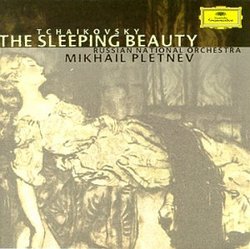| All Artists: Pyotr Il'yich Tchaikovsky, Mikhail Pletnev, Russian National Orchestra Title: Tchaikovsky: The Sleeping Beauty / Pletnev, Russian National Orchestra Members Wishing: 0 Total Copies: 0 Label: Dg Imports Release Date: 1/11/2000 Album Type: Import Genre: Classical Styles: Ballets & Dances, Ballets, Chamber Music, Historical Periods, Classical (c.1770-1830) Number of Discs: 2 SwapaCD Credits: 2 UPC: 028945763422 |
Search - Pyotr Il'yich Tchaikovsky, Mikhail Pletnev, Russian National Orchestra :: Tchaikovsky: The Sleeping Beauty / Pletnev, Russian National Orchestra
 | Pyotr Il'yich Tchaikovsky, Mikhail Pletnev, Russian National Orchestra Tchaikovsky: The Sleeping Beauty / Pletnev, Russian National Orchestra Genre: Classical
|
Larger Image |
CD DetailsSimilar CDs
|
CD ReviewsA Great Ballet D. A Wend | Buffalo Grove, IL USA | 05/24/2001 (5 out of 5 stars) "Tchaikovsky's "Sleeping Beauty" is a staple of the ballet world. It is given a great performance here by Mikhail Pletnev and his Russian National Orchestra. Perhaps even better is that the entire ballet has been put on 2 discs. The equally fine recording by Gergiev was issued on 3 discs, so you will pay less with this set.How can one describe this performance: electrifying comes to mind. This is great playing by the Russian National and highly recommended." Pletnev drifts among strong competition; can he hold water i Aronne | 03/21/2007 (5 out of 5 stars) "As I write this review, I listen to Pletnev's recording of Tchaikovsky's Sleeping Beauty. Before I say anything else, I must say this set is very well done indeed. But really, which beauty is the best? The following are the main contenders: 1. Dorati on Philips 2. Gergiev on Philips 3. Mogrelia on Naxos 4. Pletnev on Deutsche Grammophon 5. Previn on EMI 6. Rozhdestvensky on the BBC label All of them qualify as good performances, but that alone is not all that recommends a CD. The buyer must also take into account the recording quality, price/economy, and completeness of score. As for recording quality, Gergiev, Mogrelia, and Pletnev, all have the benefit of digital sound. According to what I've heard, the others are good as well (Dorati can be a bit too brassy here and there). Nothing is over-accentuated in Pletnev's clear recording for sure. Gergiev's sound is less refined without being raw. Mogrelia's atmosphere is less precise than Pletnev's, well up to Naxos standards if a bit cloudy. Dorati, Mogrelia, & Previn fall into the bargain category, Previn being the least expensive of all. As for packaging and economy, Mogrelia, and Gergiev have the disadvantage of being spread onto three CDs. This factor raises the price of the Naxos disc a bit, and makes the Philips set the most expensive of the lot. Rozhdestvensky costs a bit more because his recording comes from England. As for Pletnev, the present set comes at full price, but may be purchased used for significantly less. Universal has reissued this recording on their "Critics' Choice" label at mid-price, but we have yet to see if it comes to us in the USA. But on to the music itself. Only three are entirely complete in every way: Gergiev, Mogrelia and Pletnev. Rozhdestvensky is complete other than the omission of repeats here and there (this is probably because it was performed live: not everyone wants to hear all the Sleeping Beauty at once, though I wouldn't mind). Previn and Dorati's accounts have entire numbers missing (for Dorati, the No. 18 Entr'acte; for Previn, the penultimate No. 29 Sarabande). So where does this leave us? Pletnev wins in two of the three categories, and even the other--price--can be helped by purchasing a used copy. It is indeed worth it, for the playing of the Russian National Orchestra is magnificent. I find myself drawn into the performance even when doing something else engaging (like writing this review). Hardly the "cold, clinical sounding and clumsily-crafted westernized surrogates" that another reviewer referred to. There are no extreme tempi, unless you absolutely insist on "dance tempos" -- for me Pletnev finds the right speed in all cases, unlike Dorati who drags in the variations or Mogrelia who adopts generally slower (but rarely dragging) tempi. The Pletnev set makes its way to the top alongside Gergiev (see below). As for the humming, I cannot for the life of me hear anything out of the ordinary. Recommended with the highest confidence. September 2009 EDIT: I have since purchased both Mogrelia and Gergiev's recordings of the Sleeping Beauty (above has been slightly modified to reflect this). Though Mogrelia's work is only commendable, it is Gergiev's performance that I have really fallen in love with. It is equal in excellence to Pletnev. However, it spreads to three (far more expensive) disks and is given abysmally lacking cuing by Philips - 31 total tracks compared to Pletnev's 63 total tracks." Which Beauty to take to the ball--Gergiev, Pletnev, or Dorat Santa Fe Listener | Santa Fe, NM USA | 10/07/2005 (4 out of 5 stars) "I wouldn't think of buying multiple Sleeping Beauty recordings except for the ultra-cheap opportunities here at Amazon. Recently I acquired this set to compare to my pervious Dorati two-fer with the Cocertgebouw on Philips and the 3-disc set from Gergiev and the Kirov, also on Philips. How do they stack up?
Gergiev: First-rate conducting in excitable mode with an excellent orchestra but rather dull, tubby sonics. The only one on three discs at full price, unfortunately. Dorati: A sprightly, often dramatic reading--but with lapses--and a world-class orchestra in bright analog sound (oddly, the recording sessions went from 1979 to 1981). A budget Duo. Pletnev: An excellent orchestra led by a so-so conductor in a polished, somewht uneventful reading, in the best sound of all, from 1997. Pletnev's urbane approach is reminiscent of Ozawa and Dutoit, two other precise conductors who rarely catch fire. Two mid-priced CDs or part of a super-budget box set with Ozawa's underwhelming Nutrcracker and Swan Lake. Musically, unless you value cautious sophistication, Pletnev's reading often feels too cool and smoothed over, but DG's warm, natural sound is very involving. Dorati brings us into the theater and keeps the proceedings eventful over the long stretch of this ballet. Gergiev is the only one who pushes the music into non-balletic territroy with a strong symphonic emphasis, but the merely serviceable sound is a let down, not to mention the high price. I was surprised, not being a particular fan of Dorati's, that I become more involved in his performance than the other three. But each set has its points, and none is an outright clear winner. I only wish Decca would re-issue the classic Ansermet set, which I remember from LP as the best of all--but that was a long time ago, so who knows? " |

 Track Listings (29) - Disc #1
Track Listings (29) - Disc #1

